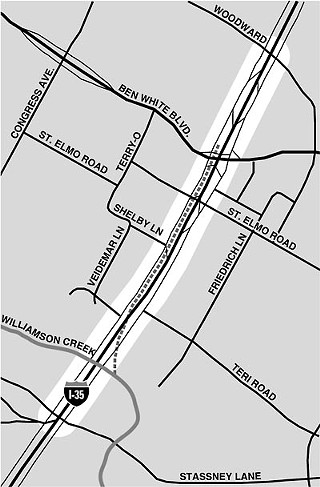TxDot's Retention Detention
The I-35 / Ben White drainage tunnel may be adequately filtered -- someday
By Dave Mann, Fri., Sept. 27, 2002

The Williamson Creek Tunnel controversy, one of those wonderfully dramatic Austin skirmishes, pitted a cadre of South Austin neighborhood groups and city officials against a monolithic state agency's massive public works project (See Tunnel Vision, Oct. 3, 1997). And now, five years after the fight, the situation threatens to flare up again, with some South Austin residents fretting that the Texas Dept. of Transportation has reneged on its promises.
While devising their makeover of the I-35 and Ben White interchange five years ago, TxDOT engineers came to the unsettling conclusion that their planned drainage system wouldn't cut it. To rectify this, they added to the plans a 6,000-foot-long, 12-foot-wide tunnel to carry storm water runoff from the highways and dump it in nearby Williamson Creek. South Austin residents were less than thrilled at the prospect of untreated highway sludge flooding their creek, which flows into McKinney Falls State Park. The plan also riled city of Austin officials, as the city had just spent 10 years cleaning up the McKinney Falls Park, making it safe to swim in again, and didn't want that work undone. When the dust settled, a deal was struck: The city would design several retention ponds and other filtration systems to partially sift the runoff, which TxDOT agreed to install in the tunnel.
But several South Austin residents say TxDOT hasn't fully implemented those filtration systems yet, and Williamson Creek is suffused with garbage and oily, metallic gunk washed from the highway.
TxDOT and city officials say they've designed and funded a filtration plan, as promised, but it won't be fully installed for several years. TxDOT engineer Don Nyland, who's working on the Ben White interchange, says one sand-retention pond has been installed, though three other ponds haven't been built yet pending further construction. City officials have halted plans for a fifth pond outside the tunnel because they haven't acquired enough right-of-way land yet. That interruption disturbs some who fought the tunnel project.
Williamson Creek "might go the way of a suburban drainage ditch," said neighborhood activist Tony Plutino, a resident of the Creek Bend neighborhood and one of several residents south of the interchange who say they're concerned about the creek's health. "It's a very vibrant system, but it doesn't get treated like that." Nyland disputes how much of the pollution in Williamson Creek comes from the interchange. Noting that much of the interchange's drainage system isn't yet connected, he argues that sludge in the creek probably originated farther upstream. Only areas south of the I-35 and Ben White merger currently drain into the creek, Nyland said, and did so even before the tunnel was built. "When you get the kind of rain we've had [this summer], you're always going to get some trash [in the runoff]," Nyland said. "We can't catch all the garbage. But how much comes from farther up Williamson Creek and how much from the tunnel is hard to say."
TxDOT completed the tunnel three years ago, before any construction started on the interchange; the agency hopes to complete the project by 2005. One retention pond has been installed in the northeast corner of the tunnel, Nyland said, and three others will be built at the tunnel's corners once more roadwork is done in those areas. City officials still hope to build a separate pipe system that will divert the dirtiest runoff, known as the "first flush," into a fifth pond next to I-35. That part of the project is on hold while the city negotiates to buy the necessary land, said Les Tull, water quality engineer in the city's watershed protection division. The filtration system will cost $1.5 million, of which the city will pay $600,000; the rest will be federal matching funds. While installation of the filtration system is moving slowly, Tull was adamant that city officials were committed to it. "It's in the plan and they have every intention of putting it in," he said.
Plutino would like to hear that from TxDOT and the city himself. "Three years is a rather lengthy amount of time to at least retrofit the tunnel [with filtration systems]," he said. "I'd like TxDOT and the city to share the plan with the community."
TxDOT isn't obligated to build filtration into the tunnel, though. Normally, pollution controls like these would be included in a highway project's environmental impact assessment, which would have forced TxDOT to install the filters or jeopardize the whole project. But the tunnel was added to the interchange design after the environmental assessment was finished, and, at the time, TxDOT and federal transportation officials decided the tunnel wasn't a significant enough change to warrant a second environmental assessment. Residents are left hoping TxDOT and the city keep their word. Residents "know the interchange needs to happen," Plutino said, but "without the filtration in place, we might see the creek turn into a dead drainage ditch."
Got something to say on the subject? Send a letter to the editor.








